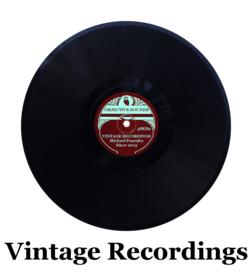
This recording was transferred, digitally restored and kindly made available to me by Julian Dyer.
Harry Woods was an American composer who spent three years in London in the early 1930s writing for film musicals. 'You ought to see Sally on Sunday' is from the Gainsborough 'Aunt Sally', released in December 1933, starring Cicely Courtneidge.
| Composers | Harry Woods |
|---|---|
| Work | You Ought to See Sally on Sunday |
| Performers | Bert Ambrose, dir |
| Max Goldberg, t-mel | |
| Harry Owen, t | |
| Ted Heath, Tony Thorpe, tb | |
| Danny Polo, cl-as-bar | |
| Sid Phillips, cl-as-bar-a | |
| Joe Jeannette, as | |
| Billy Amstell, cl-ts | |
| Ernie Lewis, Reg Pursglove, vn | |
| Bert Read, p | |
| Joe Brannelly, g | |
| Dick Ball, sb | |
| Max Bacon, d | |
| Sam Browne, voc | |
| Date Recorded | 19th December 1933 |
| Recording Location | London (89 Upper Thames Street) |
| Date Restored | 3rd October 2014 by Julian Dyer |
| Serial Number | Brunswick 01660 |
| Recording Cutter | Blumlein |
| Bandwidth | 60Hz to 6.5kHz |
| Transfer Stylus | 2.5mil truncated conical |
| Transfer Cartridge | Shure M75 |
| Transfer Turntable | Lenco L75 at 78RPM |
| Cutter Compensation | 375Hz first order lift |
| Click Reduction | ClickRepair, wavelet x3 mode, DeClick 40, pitch protection, reverse, stereo |
| Crackle Reduction | ClickRepair, DeCrackle, wavelet, 6 stereo passes |
| Low Frequency NR | DeNoise LF at 50 Hz |
| Wideband NR | DeNoise, auto, -12dB reduction |
| Limiting Filter | 48dB/octave Butterworth, at 50Hz and 7kHz |
This excellent transfer and restoration, originally listed on YouTube was completed by Julian Dyer using Brian Davies' restoration software. I have also applied a few of my own Butterworth bandwidth limiting filters to this work, along with some very mild peak limiting to bring the level up a bit.
Ambrose was one of only three British bands to be issued on the Brunswick label, all other releases being of American material. The recordings were made by Decca, who had bought Brunswick in 1933. These records are scarce compared to Ambrose's earlier HMV and later Decca records. Decca's recording technology in the early 1930s was very variable in quality, but achieved good results on this disc.
With the permission of the original transfer engineer, I have made this work available for free download.
I have decided to use Q7 Vorbis for site downloads, instead of MP3 or even FLAC, as it is just as well supported as of 2016, and provides transparency at about a third of the file size. There isn't really much point for using FLAC as the final listening format (all processing is done losslessly, of course) as the quality of the recordings themselves is already rather limited given their age. The general consensus on HydrogenAudio is that Q5 is enough for transparency with modern recordings, so the downloads offered are encoded at a more than ample Q7. Vorbis is by far a superior codec to MP3, as transparency is obtained at almost half the file size.
The audio track listed on this page is a digital restoration of a 78 RPM record, whose mechanical copyright has expired before the time of this page's publication. No later release is used so any copyright affecting such a release does not apply to any of the sound recordings shown on this page. Claims to the contrary may be vexatious if pursued. Any communication between parties claiming copyright of the material on this website and the author of this site will be published immediately with great derision. The contents of this page must not be copied represented or sold without express permission.
Julian Dyer and Michael Fearnley 2016